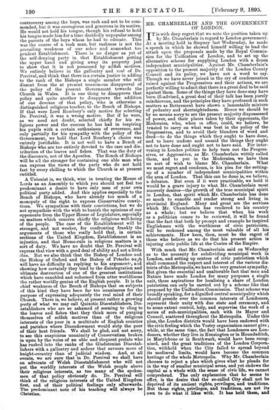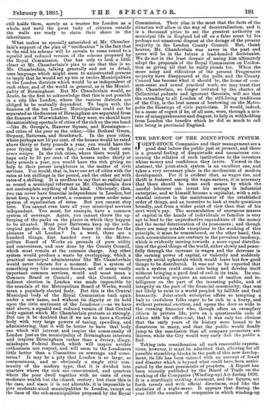MR. CHAMBERLAIN AND THE GOVERNMENT OF LONDON.
IT is with deep regret that we note the position taken up by Mr. Chamberlain in regard to London government. At a meeting held in Stepney last Wednesday, he made a speech in which he showed himself willing to lead the attack upon the proposals made by the Royal Commis- sion for the Unification of London, and to set up the alternative scheme for supplying London with a dozen independent municipalities. Against Mr. Chamberlain's opposition to the present majority of the London County Council and its policy, we have not a word to say. Though we have never joined in the cry of condemnation raised against the Progressives and their actions, we are perfectly willing to admit that there is a great deal to be said against them. Some of the things they have done may have been ill-advised, a great deal of their talk has been purely mischievous, and the principles they have professed in such matters as Betterment have shown a lamentable mixture of pedantry and shortsightedness. Hence we should be by no means sorry to see the present majority dispossessed of power, and their places taken by their opponents, the Moderates, who, when in office, could, we believe, be trusted to carry on what was best in the policy of the Progressives, and to avoid their blunders of word and deed—to do the things which they ought to have done, and to leave undone and unsaid the things they ought not to have done and ought not to have said. For inter- vening in London politics to help turn out the Progres- sives, or Aggressives, as Mr. Chamberlain wittily called them, and to put in the Moderates, we have then no sort of wish to blame Mr. Chamberlain. What we must regret and condemn, is his plea for the setting- up of a number of independent municipalities within the area of London. That this can be done is, we believe, a delusion. But even if it were practicable, we hold it would be a grave injury to what Mr. Chamberlain most sincerely desires—the growth of the true municipal spirit in London, that spirit which Mr. Chamberlain has done so much to ennoble and render strong and living in provincial England. Many and great are the services which Mr. Chamberlain has rendered to his country as a whole ; but we believe that when his work as a politician comes to be reviewed, it will be found that the fact that both by precept and example he inspired Englishmen with the worthiness of civic patriotism, will be reckoned among the most valuable of all his achievements. How keen, then, must be the regret of those who believe as we do that his present action is injuring civic public life at the Centre of the Empire.
With much that Mr. Chamberlain said on Wednesday as to the necessity for subdividing municipal work in London, and setting up centres of civic patriotism which shall command the respect and interest of the various dis- tricts of the Metropolis,we have the very greatest sympathy. But given the essential and unalterable fact that man and Nature have made London for many purposes a single unit, these aspirations for localising a share of London patriotism can only be carried out by a scheme like that proposed by the Unification Commission. That scheme was broadly speaking, for a dignified central municipality which should preside over the common interests of Londoners, represent their unity with due state and ceremony, and to some extent control, help, and supervise the work of a series of sub-municipalities, each with its Mayor and Council, scattered throughout the Metropolis. Under this plan, the London districts would have been endowed with the civic feeling which the Vestry organisation cannot give ; while, at the same time, the fact that Londoners are Lon- doners, whether they live in Kensington or in Houndsditch, in Marylebone or in Southwark, would have been recog- nised, and the great traditions of the London Corpora- tion, withheld when the City failed to spread beyond its medizeval limits, would have become the common heritage of the whole Metropolis. Why Mr. Chamberlain chooses to reject a plan which gives what he pleads for in the way of smaller municipal areas, and yet endows the capital as a whole with the sense of civic life, we cannot comprehend. The only explanation that he seems to offer, is the desire that the so-called City shall not be deprived of its ancient rights, privileges, and traditions. But those rights, privileges, and traditions, are not its own to do what it likes with. It has held them, and E till holds them, merely as a trustee for London as a whole, and until the great body of citizens outside the walls are ready to claim their share in the inheritance.
What makes us specially astonished at Mr. Chamber- lain's support of the plan of " tenification" is the fact that in the end his scheme will be certain to come round to a squalid and reduced version of the scheme proposed by the Royal Commission. One has only to look a little closer at Mr. Chamberlain's plan to see that this is so. Mr. Chamberlain, talking generally and not in detail, uses language which might seem to uninstructed persons to imply that he would set up ten or twelve Municipalities in the London districts which would be as independent of each other, and of the world in general, as is the Munici- pality of Birmingham. But Mr. Chamberlain would, no doubt, be the first to acknowledge that this is not possible in a city like London, where the various districts are obliged to be mutually dependent. To begin with, the finances of the ten London Municipalities could not be separated as the finances of Birmingham are separated from the finances of Warwickshire. If they were, we should have the astonishing spectacle of cities of the rich on the one hand —like St. George's, Hanover Square, and Kensington— and cities of the poor on the other,—like Bethnal Green, Stepney, Battersea, and Southwark. In the poor cities, where perhaps not 10 per cent. of the houses would be rated above thirty or forty pounds a year, you would have the poor frying in their own fat,—or rather in their own sauce maigre. In the rich cities, where there would per- haps only be 10 per cent, of the houses under thirty or forty pounds a year, you would have the rich giving no help to their poorer neighbours in the matter of civic services. You would, that is, have one set of cities with the rates at ten shillings in the pound, and the other set with rates of a shilling. It is needless to say that so radical and so sound a municipal reformer as Mr. Chamberlain does not contemplate anything of this kind. Obviously, then, you can never have financial independence in London, but must keep, to a great extent, a common purse under some system of equalisation of rates. But you cannot stop here. You cannot even have all your municipal services independent. You must, for example, have a common system of sewerage. Again, you cannot throw the up- keeping of the parks on the places in which they happen to be situated. Must poor Battersea keep up the sub- tropical garden in the Park that bears its name for the pleasure of all London ? In a word, there are a hundred things, first handed over to the Metro- politan Board of Works on grounds of pure utility and convenience, and now done by the County Council, which must remain at the common charge. Any other system would produce a waste by overlapping, which a practical municipal administrator like Mr. Chamberlain would never tolerate for a moment. But a system of something very like common finance, and of many vastly important common services, would and must mean a Common Board or Council ; and this Council, since indirect election in London was made impossible by the scandals of the Metropolitan Board of Works, would mean a popularly elected body. But this is the Central Municipal body of the Royal Commission back again under a new name, and without its dignity or its hold upon the civic sentiment of the Londoner ;—as we have said above, a squalid and reduced version of that Central body against which Mr. Chamberlain protests so strongly. But can it be doubted that if we are to have a Central body with very large powers of taxing, spending, and administering, that it will be better to have that body one which will interest and inspire the commonalty of London just as the municipality of Birmingham interests and inspires Birmingham rather than a dreary, dingy, misshapen Federal Board, which will inspire neither enthusiasm nor respect, and will seem to the Londoners little better than a Committee on sewerage and ceme- teries ?It may be a pity that London is so large, so conterminous, and so obviously a single civic com- munity of the modern type, that it is divided into quarters where the rich are concentrated, and quarters where the poor dwell together with no oasis of even moderate wealth but the church rectory ; but since this is the case, and since it is not alterable, it is impossible to give .moderate-sized municipalities to London, except on the hnes of the sub-municipalities proposed by the Royal Commission. Their plan is the most that the facts of the situation will allow in the way of decentralisation, and it is a thousand pities to see the greatest authority on municipal life in England led off on a false scent by his perhaps not unnatural disgust at the doings of the present majority in the London County Council. But, thank heaven, Mr. Chamberlain was never in the past and never will be in the future a lead-headed doctrinaire. We do not in the least despair of seeing him ultimately adopt the proposals of the Royal Commission on Unifica- tion as giving all that he really pleads for. When the more noisy and ridiculous of the present Progressive majority have disappeared at the polls, and the County Council has become what it should be, the home of com- mon-sense and sound practical work, we may trust that Mr. Chamberlain, no longer irritated by the chatter of Collectivist pedants and ignorant theorists, will see that the extending to all London of the still-living traditions of the City, is the best means of bestowing on the Metro- polis the blessings of civic patriotism. It would, indeed, be a cause of regret if he, of all men, were, through a mix- ture of misapprehension and disgust, to help in withholding from London the benefits which he did so much to call into being in provincial England.







































 Previous page
Previous page